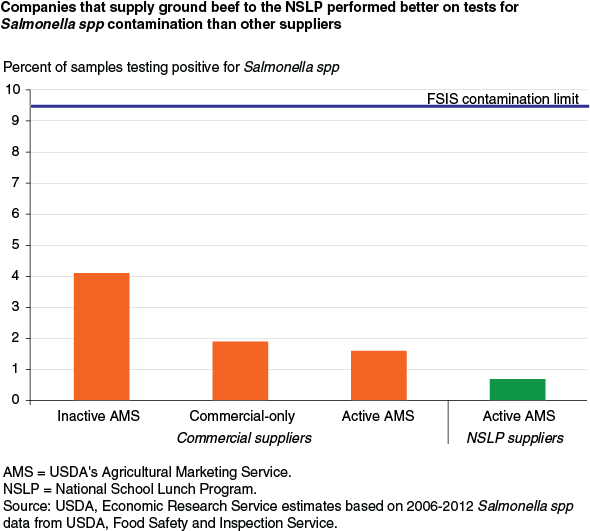Strict Standards Nearly Eliminate Salmonella From Ground Beef Supplied to Schools
- by John Bovay and Michael Ollinger
- 2/2/2015
The National School Lunch Program (NSLP) provides subsidized or free meals to more than 31 million children each school day. USDA’s Agricultural Marketing Service (AMS) supplies some food to the NSLP, and additional USDA funds are used to reimburse schools for meals served as part of the program. Each year, AMS buys approximately $150 million worth of raw and cooked ground beef products for use in the NSLP, about half of all ground beef served in the program.
AMS requires ground beef suppliers to adhere to strict contamination limits for Salmonella spp and other illness-causing pathogens. Producers seeking to supply ground beef to AMS for the NSLP must invest in food safety processes and inspections, which increases the cost of production. At the same time, AMS is obligated to select the lowest cost bidder among the companies that agree to meet the AMS standards. AMS ground beef suppliers have to consider the costs of food safety investments when evaluating whether to bid on NSLP contracts.
USDA’s Food Safety and Inspection Service (FSIS) oversees all U.S. meat producers and requires that no more than 9.4 percent of ground beef samples test positive for Salmonella spp in any given sampling period. AMS has more stringent standards, refusing any shipment that tests positive for Salmonella spp.
ERS researchers examined the performance of three groups of ground beef suppliers: active AMS-approved suppliers, AMS-approved suppliers that did not bid on any NSLP contracts in a given year (“inactive AMS suppliers”), and producers not approved by AMS to supply the NSLP (“commercial-only suppliers”). While all groups performed better on Salmonella spp tests than the FSIS standard requires, the data indicate that the AMS standards incentivize producers to supply ground beef to the NSLP that has lower levels of Salmonella spp contamination (0.7 percent of samples testing positive) than the ground beef the same suppliers sell to commercial buyers (1.6 percent of samples testing positive). The food-safety performance of ground beef sold to NSLP was also better than that sold by commercial-only suppliers, which had 1.9 percent of samples testing positive. Researchers found that inactive AMS suppliers who sold ground beef in the commercial market performed worse on Salmonella spp tests than other commercial suppliers, with 4.1 percent of samples testing positive for Salmonella spp contamination. This last result suggests that AMS-approved suppliers assessed their ability to meet the NSLP Salmonella spp standard cost-effectively and bid on AMS contracts accordingly.
This article is drawn from:
- Ollinger, M., Guthrie, J. & Bovay, J. (2014). The Food Safety Performance of Ground Beef Suppliers to the National School Lunch Program. U.S. Department of Agriculture, Economic Research Service. ERR-180.
We’d welcome your feedback!
Would you be willing to answer a few quick questions about your experience?


